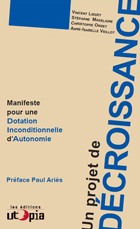
An abandoned city, another one plagued by demonstrations fuelled by petro-dollars… nothing new really. Except that we are not talking about Detroit, the Greek crisis or the arrival of massive investments into our industries originating from the Gulf countries. No, today, the collective “Un Projet de Décroissance” (« A Degrowth Project« ) takes a look at sports. Sport that created the Olympic city of Sotchi that is already in ruins and ruined; sport which embarrasses Rio for the outrageously costly World Soccer Cup. Of course, it is soccer country but it is also favelas country; the sport also receives massive investments funds from the Gulf countries, as if money were the fuel of sport, leading it to its downfall. Sport is not a simple game anymore. It is far more, rather, far less.
Published on Reporterre.net on the 10th ofJune 2014.
Whereas the environmental, social and economic situation is deteriorating by the day, the crisis does not appear to be a temporary situation leading to a better future. Growth society is doomed to collapse, sport remains an unavoidable element and a safe heaven in our society. Omnipresent, it affects all areas: from the most basic sport activity to the self-validating arenas, and the clothes, the health and education sectors, or as a vector of the entertainment industry.

Despite hundreds of millions of players worldwide and billions of TV viewers, its importance in the global market, its politico-financial complicities and its hegemonic power over the bodies, sport often remains presented as a simple game.
A simple game, neutral and beneficial since it conveys healthy values such as health, sharing and friendship, it could ease tensions, enhance social harmony and solve all conflicts. Isn’t it presented as a remedy to society’s ills: at once a social ladder and a solution to delinquency? This representation of sport as a positive element in our society is obviously due to the players in our media and political system, which persist in making sport a linchpin of the population’ wellbeing (development), when it is not used to measure the wellbeing of the country… or to boost its spirits up.
Behind this idyllic façade, in reality the hold of sport in our society is quite different. It is far more insidious and pernicious. This is not a simple game any more. Thanks to its hyper-merchandising, it is part and parcel of homo-economics’ scompetitive society Therefore it engenders considerable damages as sponsor of Grands Projets Inutiles et Imposés (GPII)- Imposed Unnecessary Large Projects) and Petits Projets Inutiles et Imposés (PPII) (Imposed Small Unnecessary Projects) as well as by circulating values that lead to a better control of the people following the adage: “better run than think”. “Opium of the people”, sport is also energy intensive and uses great amounts of concrete, and it is also an outlet for our nationalisms.
Sport has gone overboard. It needs ever more gigantic infrastructures: either to assert its high-level practices – its showcase -, or to provide entertainment to the populations; thus echoing mass tourism and hyper-merchandising. We have entered an era where sport is a tool of profit.
It demands colossal infrastructures but also equipment and a high-tech pharmacopeia that always need more raw materials, high-tech machines and energy. Big stadiums or massive sport arenas; a speciality of the Olympic games, have a limited usage time. They are symbolic examples of excesses deeply embedded in space, such as the ruins of Sarajevo Olympic games, Berlin, Athens but also Beijing and already Sotchi. Nevertheless, they cannot make us forget that public policies delve in manipulating territories by prioritising the supply of equipment, since it constitutes an asset for education and health. Gymnasiums, leisure centres, adventure circuits, golf courses or the synthetisation of sports grounds are multiplying. PPIIs become attractive for the councils. They have a point in common with the GPII: giant parking lots accompany their construction. We should not forget that sport is synonymous with long distance travels for equipment and people. The car escorts sport in its march forward.
Artificialisation of lands, intensive concrete use, primary resources waste, ever greater energy demands (sport often takes place at night), without forgetting its share in the world industries: textile industry and high-tech equipment required to practice one’s passion properly: sport is a tool of the growth society which is at the heart of the pillaging of the planet’s resources and of irreversible pollutions. Are all these resources required to engage in sport?
Moreover, we cannot bypass the visual and mental polllution screated by sport through its communication infrastructures: mainly advertising which it uses and abuses. Big sport brands provide the most upsetting example, since our children are more apt to recognise the coma of an American brand, produced cheaply in Asia or the three-strikes brand rather than the trees growing around them.
The logic of sport is characteristic of the capitalist society that created it. Nowadays, sport is the product of growth society, at once a sub-system and an ideological support. In fact, apart from being linked to Growth as a beneficial sector to capitalism, it conveys its values and worldview: it westernises the worldlike a new colon explaining the new practices and right investments required. Sport and its practice are not neutral and it spreads the values of the Growth society: the praise for high performance, competitiveness and productivity. It is organised according to the logic of growth aimed at increasing productivity, efficacy, following the principles of evaluation, comparison, hierarchy etc.
This is why a critique of sport is part of a social critique not to be neglected. Nowadays everyone is engaged in the same sports, with the same heroes, but also the same brands. Therefore, sport contributes to colonise our imaginaries, between two ads, it occupies our brains and turns us into consumers and accomplices of the Growth society.
In the past we said: “Some bread and some games” Today, we would probably say: ” Big Macs and sport” that often turns into “beer, soccer…concrete and oil”.
We need to understand the phenomenon to get out of it and for the notion of play to reclaim its rightful place. The stakes are high even though sport might not appear to be a priority. Yet, we must fight it since individualism and competitiveness are values we would like to replace with sharing and conviviality. Conviviality should take over, not the opposite.
Sport reflects society’s evolution and its pitfalls become more visible: they were inherent since its conception. Commodification and profit seeking have not “put sportsmanship at risk”, rather it is a question of the inherent logic of capitalism. Therefore, we must put an end to sport as the “be all and end all” immediately, for sport to become play again, a simple pleasure and not another outgrowth of capitalist productivism, to change attitudes and start a worldwide change. We must put a stop to sport as almighty, right now.
We can already follow other pathways: end professionalism,which gives too much credence to sport activities, stop the building of mega sport stadiums and events, and limit motorised sports. But we should not throw away the baby with the Olympic swimming pool water too fast. Admittedly it reeks of money and oil but the baby must be saved and be re-oriented towards play, conviviality and sociability, since sport is still practiced candidly by thousands of children. This is why we cannot leave sport into the hands of the Growth society and we must open our societies to… play: no more no less.
Christophe Ondet, Vincent Liegey, Stéphane Madelaine, Anne-Isabelle Veillot, and Thomas Avenel for « A Degrowth Projet » collective.
A Degrowth Project – Manifesto for an Unconditional Autonomy Allowance, Utopia.
 “ […] the prerequisite for the transfromation of the economy is “ a strong adhesion from all and a participation to this desire for change”. That is the least … But we have to start somewhere and this stimulating book contributes to it undoubtedly”. Hervé Kempf in Le Monde.
“ […] the prerequisite for the transfromation of the economy is “ a strong adhesion from all and a participation to this desire for change”. That is the least … But we have to start somewhere and this stimulating book contributes to it undoubtedly”. Hervé Kempf in Le Monde.
“ And the success of the book may suggest that “transition is well underway”. Emmanuel Daniel in Slate.fr.
And also:


